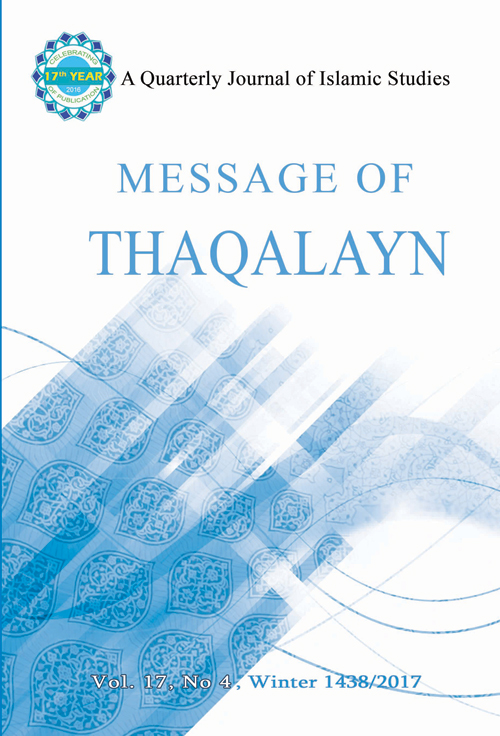فهرست مطالب

Message of Thaqalayn
Volume:17 Issue: 3, Autumn 2016
- تاریخ انتشار: 1395/09/20
- تعداد عناوین: 7
-
Page 7Earlier articles in this series offered an overview of the sources of both the dominant world religions and Islamic sources on the concept of the End of Times - the worlds state of affairs before and after the coming of Imam Mahdi to establish worldwide justice and peace. Using the Quran and hadith as sources to visualise the future and increase our knowledge on the advent of Imam Mahdi with the purpose of establishing a positive relationship with him and preparing for his return, the previous parts expanded on the qualities of the people of this time, including their intellectual condition, and scientific and technological advancements, and signs of the moral, cultural, and religious state of affairs before and after his return. This part further delves into the state of affairs after his return, such as establishing universal brotherhood, peace and love.
-
Page 15The Quran describes the Day of Resurrection as a mashhad , which means a place, time or stage of witnessing (11:103, 19:37). It is by essence when the truth and hidden realities are disclosed (10:30, 86:9, 100:10). This is a central quality of that Day, by which the Quran has sworn (85:3). Whereas ones book of deeds is his own soul (17:13-14), witnesses are external beings that have encompassed ones deeds. Therefore, witnesses will complement the records of deeds as they both relate to the process of judgement of individuals in the Hereafter.
-
Page 25Apart from the theoretical meaning of commitment to wilayah, it is reflected in the actions and behaviours of Muslims and believers who are committed to it. The person truly committed to wilayah can be only known from his actions; otherwise, commitment to wilayah is not achieved through mere claim and knowledge on its importance. The Battle of Karbala was replete with such commitment to wilayah in which Lady Zaynab is the prime example of. This article seeks to elucidate Lady Zaynabs commitment to wilayah from Medina to Karbala, and then Sham (Damascus) by her obedience to - and protection and defence of - Imam Husayn.
-
Page 41Anxiety, depression, mental disorders, and worries are among the predicaments of human society in the present century. In recent decades, the factors contributing to, preventing, and curing these illnesses have been addressed from different angles. The resulting achievements are various cognitive, behavioural, psychological, psychodynamic, and biological theories that, of course, led to valuable outcomes. This paper addresses this issue from two perspectives: the psychological perspective and that of the Quran and hadith.
-
Page 57Perspectives about the ideal Muslim woman continue to be a kaleidoscope of various readings of different Muslim women throughout history. The four women of paradise, as cited in hadith literature, refer to Lady Maryam (Mary), Lady Asiyah (the wife of Pharaoh), Lady Khadijah (the wife of Prophet Muhammad), and Lady Fatimah (the daughter of the Prophet). 1 Although they are all considered to be historical figures, and there is much to be said about them, only the first two have been mentioned in the Quran, and only Lady Maryam is mentioned by name. Lady Maryam and Lady Asiyah are particularly noted in the chapter al-Tahrim as mathal , or role models and examples, for all of mankind. In this paperwe hope to provide a brief biographical sketch as well as an analysis of the verses related to Lady Asiyah from classical Sunni and Shii commentaries of the Quran. We also hope to touch on the attention that Lady Asiyahs famous sentence in Surah al-Tahrim has warranted from the gnostics ( urefa ) in exegetical commentaries by the likes of Allamah Tabatabai.
-
Page 71Propagation is a prevalent means of communicating thoughts, culture, and any message to other people. Various schools of thought have traditionally conveyed their messages to their addressees through different means. The best source of propagation is the Quran. To perfect this subject, Prophetic Sunnah and conduct is used. In Quranic propagation, the following principles overshadow other methods of propagation: commitment to morality and values, significance of role models who were pioneers, correspondence between actions and sayings, indirect methods of propagation in practice, and taking situations into account which nowadays requires us to make use of movies, stories, novels and different media as a means of propagation as well as invoking the intellect and inviting people to think, use simplified speech, recognizing the capabilities and competencies of the addressees and treating them wisely, using explicitness and clarification, impartiality and avoiding discrimination, and so forth. Using Allamah Tabatabais views, this paper investigates the abovementioned methods and merits of Quranic propagation.
-
Page 99Having a shared identity working towards a joint cause is vital for a healthy community. In doing so, a community must share specific qualities in order to be successful. This series of papers offers a glimpse into the importance of community-building and Prophet Muhammads efforts to implement it. Character traits such as truthfulness, trustworthiness, justice, unity, moderation, humbleness, enjoining good and forbidding wrong, and maintaining a healthy balance in working for this world to eventually lead to a blissful hereafter were illustrated. Another important quality of a successful community is their implementation of justice, also one of the principles of Shii Islam. The previous article expanded on Allahs justice in the Quran, early controversy on the meaning of Allahs justice, the Shia view of justice, the necessity for establishing social justice, having just leaders, and examples of justice observed by the Ahlul Bayt. This article studies status of rationality, knowledge and experience in an Islamic community.

